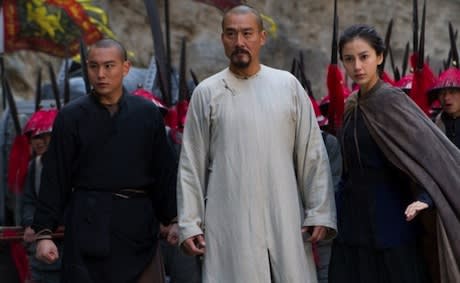After the zany videogame- and cartoon-influenced steampunk martial arts mania of Tai Chi Zero, Tai Chi Hero has certain expectations to surpass, or at least live up to. Basically: flinging-shit-at-the-walls insanity. But exuberant director Stephen Fung has gone in the opposite direction for this sequel to his consistently entertaining genre bender.
Hero is the calmer, more composed older brother of Zero. Picking up right where the previous chapter left off (well, after a brief meta aside that doesn't pay off until the end of the film and a recap of the first movie), Yang Lu Chan (Yuan Xiaochao) still hasn't mastered Chen-style kung-fu, but he's set to marry Master Chen's daughter, Yu Niang (Angelababy), so that he won't technically be an outsider while he hones his craft.
As explained via flashbacks, there's a prophecy stating that ruin will befall the Chen village if an outsider learns their sacred brand of kung-fu. In place of the frequent wild physical showdowns that typified Lu Chan's first adventure, Fung places greater emphasis on developing character relationships, particularly between Master Chen and his estranged son (Feng Shaofeng), who's the black sheep of the family due to his disinterest in upholding traditions — machinery-obsessed, he's drawn to new technology.
For the first act, romantic comedy is given almost equal footing with Sammo Hung's deftly choreographed action — Lu Chang and Yu Niang's marriage of convince needs a screwball way to blossom into real love –—but once the kung-fu prodigy has his "energy balanced," elaborate battles rule the remainder of the picture.
The political side of the Tai Chi story feels somewhat underdeveloped, despite its prominence, as there are too many saggy scenes involving Peter Stormare's Duke Fleming plotting with the villainous Fang Zi Jing. It's clear that foreign interests are manipulating the Chinese government, but there's little payoff in the story. Maybe the Duke will play a more vital role in the promised third chapter of the series.
Action lovers will find much to hold their attention and Stephen Fung's vision is never short of bold, with a tremendous amount of effort invested in almost every scene, but Tai Chi Hero is disappointingly sloppy, in places. It's especially frustrating when entire battle sequences are shown in blurry, grainy slow motion. With most of the movie so conscientiously composed, these ugly shortcuts stand out all the more.
Inconsistency works fine for the music, however, which ranges from off-kilter European waltzes to thrash metal and traditional classical arrangements — the clashing tones fit with the erratic stylistic jumps of the filmmaking.
If he continues to refine his methods of repurposing a wide variety of pop culture influences, Fung's brave risk-taking should eventually cohere into something as fluid as it is unique.
(Well Go USA)Hero is the calmer, more composed older brother of Zero. Picking up right where the previous chapter left off (well, after a brief meta aside that doesn't pay off until the end of the film and a recap of the first movie), Yang Lu Chan (Yuan Xiaochao) still hasn't mastered Chen-style kung-fu, but he's set to marry Master Chen's daughter, Yu Niang (Angelababy), so that he won't technically be an outsider while he hones his craft.
As explained via flashbacks, there's a prophecy stating that ruin will befall the Chen village if an outsider learns their sacred brand of kung-fu. In place of the frequent wild physical showdowns that typified Lu Chan's first adventure, Fung places greater emphasis on developing character relationships, particularly between Master Chen and his estranged son (Feng Shaofeng), who's the black sheep of the family due to his disinterest in upholding traditions — machinery-obsessed, he's drawn to new technology.
For the first act, romantic comedy is given almost equal footing with Sammo Hung's deftly choreographed action — Lu Chang and Yu Niang's marriage of convince needs a screwball way to blossom into real love –—but once the kung-fu prodigy has his "energy balanced," elaborate battles rule the remainder of the picture.
The political side of the Tai Chi story feels somewhat underdeveloped, despite its prominence, as there are too many saggy scenes involving Peter Stormare's Duke Fleming plotting with the villainous Fang Zi Jing. It's clear that foreign interests are manipulating the Chinese government, but there's little payoff in the story. Maybe the Duke will play a more vital role in the promised third chapter of the series.
Action lovers will find much to hold their attention and Stephen Fung's vision is never short of bold, with a tremendous amount of effort invested in almost every scene, but Tai Chi Hero is disappointingly sloppy, in places. It's especially frustrating when entire battle sequences are shown in blurry, grainy slow motion. With most of the movie so conscientiously composed, these ugly shortcuts stand out all the more.
Inconsistency works fine for the music, however, which ranges from off-kilter European waltzes to thrash metal and traditional classical arrangements — the clashing tones fit with the erratic stylistic jumps of the filmmaking.
If he continues to refine his methods of repurposing a wide variety of pop culture influences, Fung's brave risk-taking should eventually cohere into something as fluid as it is unique.
